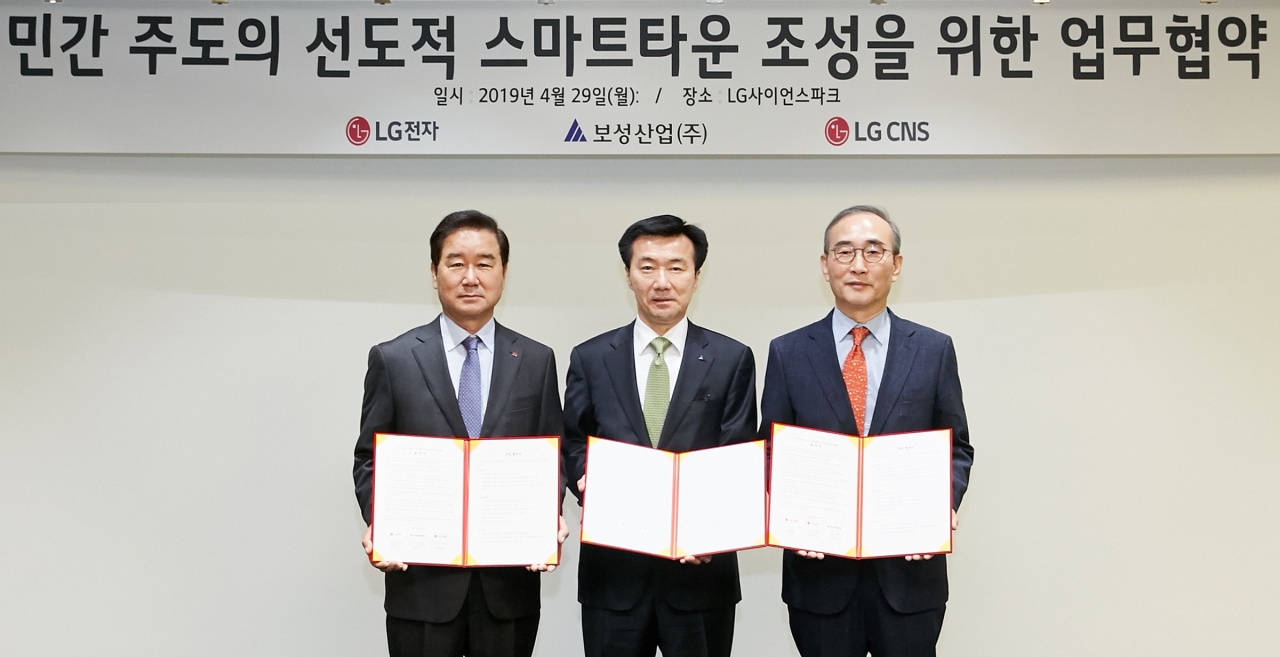LG CNS, an information and communications technology solutions affiliate of LG Group, is taking the lead in the ongoing efforts to build smart cities across South Korea by offering secure solutions, according to the company on Monday.
The LG unit is currently participating in multiple smart city projects led by the Ministry of Land, Infrastructure and Transport and by provincial governments.
Among others, LG CNS is providing consultations on government-led smart city projects in Sejong and Busan since July.
The company is advising the two cities on the establishment of artificial intelligence data centers and internet of things infrastructure.
In Busan, it signed a trilateral agreement with Bosung Corp. and LG Electronics. Local business Bosung owns about 660,000-pyeong of land (1 pyeong equals 3.3 square meters) in Busan for the smart town, while LG Electronics can provide smart appliances, IoT infrastructure and energy solutions.
 |
From left: Choi Sang-gyu, head of the Korea sales division at LG Electronics, poses with Bosung Corporation Vice Chairman Kim Han-Kee and LG CNS CEO Kim Young-shub after signing an agreement in July. (LG CNS) |
With Bosung, LG CNS is planning to launch a joint venture within the year.
LG CNS said its proprietary smart city platform, “Cityhub” -- the first from a conglomerate unit in Korea to be certified by the Telecommunications Technology Association -- attests to its technological competitiveness in the smart city sector.
Cityhub is designed to serve as the heart of a smart city, controlling transportation, safety, energy and environmental services on a single platform.
It supports oneM2M, an international IoT standard, and 98 other standards for the logistics, manufacturing and retail industries.
“Based on the vast coverage of industrial standards, the platform can collect and manage data from different industries,” a company official said.
LG CNS is also developing solutions to ensure more convenient and secure transportation, including personally owned cars, buses, subway and railway systems, and airlines.
One of these will involve connecting different transport systems together by means of automatic fare collection, fleet management, cooperative-intelligent transport and air traffic control systems, in order to provide real-time traffic information via multiple channels.
The company worked with the Seoul Metropolitan Government to create its public transportation card system in 2004 and exported that system to Wellington and Auckland in New Zealand in 2008.
The Korean system was then introduced in Colombia in 2011, Malaysia in 2012, Greece in 2014 and Qatar in 2016.
As the chair company of the Smart City Convergence Alliance, launched under the Presidential Committee on the Fourth Industrial Revolution in February, LG CNS is taking part in selecting pilot smart cities, reviewing basic plans for the establishment of smart cities and drafting plans for the renewal of each city.
Since January, the LG company has been part of the Land Ministry’s strategic plan to transform Sejong’s 5-1 District into a smart city called the “Life Zone.”
In April and May, the company won orders from Jeju and South Jeolla provinces to offer know-how for the establishment of plans for smart city zones on the island as well as Haenam.
It is also in the process of setting strategies and plans for smart cities in Goyang, Gyeonggi Province, and Magok, northwestern Seoul.
By Song Su-hyun (
song@heraldcorp.com)




![[Herald Interview] 'Trump will use tariffs as first line of defense for American manufacturing'](http://res.heraldm.com/phpwas/restmb_idxmake.php?idx=644&simg=/content/image/2024/11/26/20241126050017_0.jpg)

![[Health and care] Getting cancer young: Why cancer isn’t just an older person’s battle](http://res.heraldm.com/phpwas/restmb_idxmake.php?idx=644&simg=/content/image/2024/11/26/20241126050043_0.jpg)

